Transcript:
Nick James:
Hello, I’m Nick James. I’m the Founder and Event Director of #RISK, a series of large-scale events starting in London in November 2022. I’m delighted to be joined today by Amanda West, one of our #RISK ambassadors. Amanda enjoyed a highly successful career at Reuters, Thomson Reuters, and Refinitiv, in senior marketing, innovation, and digital transformation roles, creating start-up businesses, leading global teams, and managing complex projects. Amanda, welcome.
Amanda West:
Thanks, Nick. Good morning. Good to see you-
Nick James:
And you.
Amanda West:
… and [crosstalk 00:00:55] thanks for having me.
Nick James:
No, no. Delighted. As I said in my introduction, you spent most of your career in innovation and digital transformation.
Amanda West:
I did.
Nick James:
Obviously, over the last two to three years, we’ve seen this massive acceleration of digital transformation, and while this generates new opportunities, it’s also creating new risks. How do you suggest people balance the two?
Amanda West:
Yeah. No, that’s a really good question. It’s always difficult and the way that we used to attempt to do this at Refinitiv, luckily, where I ran an amazing team of people who were very involved in digital transformation of the business, was to use that horrible buzzword, to try and keep everything agile. By that, I don’t just mean do things quickly. It was much more about trying to manage your level of investment as you proved out whether there was something really valuable in the work that you were doing, so really, spend as little as possible early on until you’ve actually been able to take whatever it is you are developing, building, changing, transforming, to the customer.
Amanda West:
We used to really be quite obsessive about customer testing, trying to get things in front of maybe your worst customer because they’re most likely to really give you a good run for your money, but making sure that you show them what you’re doing as early on in the cycle or the multiple cycles you will go through. Customer testing, always focusing on the things that you know are going to be the most challenging, so tackle those up front because they never go away. Don’t leave them until later on in your project, and then really focus on making sure that you understand the cost of operating whatever it is that you’re lucking to transform or building because there with digital transformation, there are often really quite hidden costs that make what you’re doing really not as successfully potentially as you would like it to be.
Nick James:
I think that’s a very brave thing, Isn’t it? To take something to your most difficult or most awkward customer, right from the beginning, but-
Amanda West:
Yeah.
Nick James:
… but yes, I can see how that could pay dividends.
Amanda West:
You sort of… You need to know them well. You need to have invested time in building a relationship with them, but your harshest critics are often the people who will be kindest to you in terms of pointing out what won’t work.
Nick James:
Absolutely, so you don’t want yes people in the process really, do you?
Amanda West:
No. I mean, it’s nice to have some. It’s always good to have a few of those along for the ride, but no, you really need to go to the ones who are going to challenge you.
Nick James:
Moving on from that because this is so much about people, how important is it to attract, retain, and develop diverse talent to spur innovation?
Amanda West:
Wow. Okay. To me, that’s like the top thing. There are only really two rules in my book for people who are attempting to innovate. One is you have to have the buy-in of the senior crew. Don’t go there if you don’t. It’s not worth it, but the second one is all about your team. Yeah, and some of the projects that I worked on that were most successful or perhaps most transformative often had extremely diverse teams, but recruiting the best people is hard, so as a leader, I spend an enormous amount of my time focused on the team recruitment, onboarding, communicating with people, and then trying to set the right conditions for success.
Amanda West:
You know, years ago, that would be about paying people the right amount, which is still really important, but today it’s not enough. You need to both pay people, but really also think about what the right conditions are for their success, not just your success, the company’s success, but what will really motivate the key people, the most fundamental people in your team to do a supremely amazing job? Nowadays, it isn’t just about money and bonuses, which are important, but it’s really about work-life balance, it’s about making sure that you are constantly thinking of ways to help people develop their own, and this is going to sound really bizarre, CVs because they have lives outside of your company. If they’re not progressing individually as people, they will move.
Amanda West:
I had a really talented team of data scientists and we would spend a lot of time trying to make sure that they could get access to the best people in their world, let’s say MIT in the States, which is very big in data science, or perhaps some of the key companies like Google or Amazon who we worked with. Those are really, really, really important things and you have to then take a genuine interest in what motivates your team, your people. Diversity isn’t really just about gender. It’s about the whole sort of ’left brain-right brain’ culture. We ran a very global business, so different cultures, language, different religion, there are so many elements, but it’s fundamental. Without a great team, you’ll never succeed.
Nick James:
Yeah. It is all about the people. Ass we’ve talked about in the past, our strap line for #RISK is that risk is now everyone’s business, and organizations have to, I guess, embrace cross-discipline risk management. What do you see are the most common digital transformation risks?
Amanda West:
Wow. Okay. Well, I think every digital transformation has a few things at the core that you have to put on the table every time round. The first is that you really need to help practice something I said a little while ago. You really need to have the buy-in of the senior leadership team, a management team who are ultimately funding whatever it is that you are doing. You need their buy-in across all the different elements of the work and you need their buy-in order to really understand that these are never one-off projects. They have an ongoing investment, and so often you are having to try and sell to senior people who think they understand what you are doing, but almost inevitably because of the pace of technological change, they don’t really. You have to educate them. Spend the time to educate them sufficiently so that they understand the upfront and then ongoing costs of transforming that business.
Amanda West:
That would be my first point. It would be if you haven’t explicitly told and educated the senior leadership team, you’ll probably come unstuck pretty quickly because these projects do take time and cost often more than people anticipate. Let me give you an example. When I was still at Refinitive at the beginning of the pandemic, we inevitably being a data company invested quite a bit of time looking into what we thought the key drivers and risks were for the pandemic. That was really hard to do because at the time there wasn’t really necessarily enough data that you could tie directly to what was going on day in, day out, but there was loads of historical data that we had that you could look at applying some AI to start to look for patterns.
Amanda West:
Our senior teams spent probably every week phoning me and saying, “When’s this going to be ready? When’s this going to be ready?” They actually had no appreciation of how hard it was to do those risk assessments and then to validate them. We used to have to try and explain that we were dealing with massive historical data sets, really complex compute, but they really, really, really didn’t appreciate it. I think they thought that we were just sort of stalling because we weren’t a hundred percent convinced we could do the work and pay. We eventually got there, but it was a real lesson in really having to bring your senior leadership team with you. Then, when they eventually saw some of the work, they looked and they said, “Oh, okay, we like this and this, but we don’t like those data sets because they’re not clean,” which is very often the case with large sort of historical data sets.
Amanda West:
We then had to sort of do 50 U-turns in order to get the work out, so I would say always get the senior team, and then there are the inevitable gotchas that always in all of these projects… Digital transformation always has security at the core. Whatever you’re doing, there will be security risks associated with it. Again, most companies have teams or individuals who are specialists in the domain of the security domain. You have to put that front and center.
Amanda West:
The other one I would just always focus on, but this is really probably very tied to where I came from, is your data. Most digital transformations, you’re dealing with new data sets, customer data or data that you’ve acquired about your own business that you’re applying in the transformation. Very often, it’s critical to understand, do you own that data? Can you use it in the way that you think you want to use it? Have you applied any bias in that? There are always sort of data and security risks that you need to put front and center to every project, and I think that probably applies to everyone.
Nick James:
The next question, I guess, leads on a little bit from that, which is talking about sustainability. It’s now at the top of corporate agendas worldwide-
Amanda West:
Yeah.
Nick James:
… and ESG, environmental, social, and governance goals, have become major considerations in companies’ digital transformation programs. In your view, who owns ESG within an organization?
Amanda West:
Well, that’s the hard thing. It’s an ever-changing situation, ESG, on so, so, so many levels. I’m going to slightly dodge the question in the sense that I don’t think there is a one-size-fits-all. I think how ESG is treated by a company depends on the business. Is ESG just something that you need to consider from a brand perspective? Or are you actually selling product or services that are ESG-informed? Those are two very different sort of ways of looking at ESG, and so you need to think about what you’re doing across a number of dimensions I would argue. Te first is, do you have a strategy? Is it written down? Can people find it? Is it simple to read about and to understand? Everything needs to be kept, I think, as simple as possible.
Amanda West:
Then, the second thing is, do you sort of understand the levers that for your business are going to be really, really fundamental changing regulations, changing dynamics around physical resources, water, climate? These are all very, very business-dependent. How does it impact your brand? What are your privacy and security strategies? There’s the sort of strategy, then the levers, and then you need some form of hopefully not too complex framework for people to be able to understand how as a business you are going to track these things, and then in many cases, report on them because you will have to have some level of potentially sort of reporting.
Amanda West:
I’m making it sound complex, but this is what most companies do strategically anyway when they think about risk. ESG is just another dimension and a new one and an ever-changing one, so keeping it simple and making sure that everyone in your senior leadership team understands those things, and I really mean everyone. Even if they’re not directly playing, doing things that impact them, they have to understand that. That’s sort of critical.
Nick James:
Effectively, what we’re talking about is making sure, and it’s a bit of a cliché, but making sure that ESG is baked into an organization’s strategy and that everyone understands it, but do you think that boards have the relevant experience and expertise?
Amanda West:
Ooh. Well, okay, so having both watched boards and had to sort of perform for boards as an employee, and then having also been a NED, this situation is changing so rapidly and in so many different dimensions, I would just say that if you are on a board, you really need to make this one of your key areas of interest and concern that the company you’re looking after, leading, or sort of managing really has the same things I was saying, the strategy, the frameworks, in play. My one piece of sort of persona advice would be you actually have to dig in and really understand the levers sufficiently well, but if you’re a NED as opposed to an exec, if you’re a non-exec, you need to strike a really careful balance because your job is not to run the company. Your job is to help the company be as effective as possible and stay the right side of the law, frankly, all the time.
Amanda West:
You need to call upon the execs to make sure that they can explain the strategy to you, they have the framework, and then your job is to help refine that with them, but not to do it. It’s a really tricky balance to actually strike, I would say, and it’s one that people need to stay on top of all of the time.
Nick James:
I guess part of the ESG is is gender equity, and obviously that’s a challenge in all parts of society, but it’s not only a woman issue. It’s an issue for men, too. What would you say is the role of men in the workplace? How can we support women in achieving gender parity?
Amanda West:
Hmm. Okay, so you know me well enough to know that this is a topic that I’m extremely passionate about, but equally it’s not a topic that I see just as sort of men and women. I actually think it’s much, much more about really taking care of your employees, your peers, and being really truthful and honest about how you come, how you show up at work every day. Are you actually being an effective leader? I really mean leader. I don’t need manager. I mean, are you out there and being fair, trustworthy, transparent, and showing people, sort of motivating them to know where they’re going?
Amanda West:
Personally, I don’t really like to look at it as just a male and female thing. Now, having said that, you and I have been around this block long enough to know that there are some really, as you say, baked in sort of behaviors that need calling out and I would encourage anyone and everyone to call those out because that’s actually the only way you can drive the level of change, but they’re not peculiar to men or they’re not aimed solely at women. I really think bad behaviors do need to be called out.
Amanda West:
If I look at it personally… Hmm. When the #MeToo movement really started, I have two girls and one of them said to me, “You know, Mom, did this happen to you?” Honestly, absolutely, tens if not hundreds of times in one way, shape, or form or another. I worked in the city, IU worked in a very, very male-dominated environment, but actually, what we need to do is move on and try and make sure none of that gets repeated, and so it’s about sort of looking at yourself in the mirror and trying to be as effective a role model as you possibly can and be brave enough to call out bad behavior. That’s my view.
Nick James:
Amanda, I’m sure that we can carry on with that over a glass of wine and put the world to right sometime in the future. My final question is from a business or a society point of view rather than a personal point of view, but what keeps you awake at night?
Amanda West:
Ooh, from a business perspective? Well, you know, we’ve all got geopolitics, wars, we’ve all got climate change. I mean, they are horrendously huge topics, but if I really think about from a business perspective, I do… There are probably two elements. One is balance of power. Who’s in charge. You know, there are some very, very, very large companies out there. Do they have the right in-built sort of ways of managing their business to be morally in the right place all the time, question mark? That’s definitely a concern and one that will only get worse I suspect because technology is so prevalent and these are all tech companies or companies built of technology.
Amanda West:
Then, the other one that I just feel sad about, actually, and I do think businesses are going to have to change around, it’s just the mental health of employees. I think the pandemic has been actually very, very, very challenging for lots of people who will need quite a while to find their mojo again and reacquaint themselves with the work environment, you know, sort of in the office. We don’t have great infrastructure to deal with people who are struggling, so that would be the other thing, which is a bit personal and about people, but I do think it’s a thing that’s going to be incumbent on companies to actually have to really care about.
Nick James:
Amanda, thank you very, very much. That was fascinating and I think the two things that I have taken out of that are that it’s about leadership and it’s about people. If the leaders… I don’t know, everyone’s got to find their moral compass, I believe, and-
Amanda West:
Yeah.
Nick James:
… and if you’ve got your moral compass, then you’ve got to stick truth to it and you’ve got to keep aiming for true north and, yeah, but as I say said, absolutely fascinating, Really enjoyed our chat and look forward to catching up again soon.
Amanda West:
Brilliant. Great to see you, Nick.
Nick James:
Thank you very much. Bye-bye.
Amanda West:
Take care. Bye.
Nick James:
Bye.
#RISK Founder Nick James in conversation with Amanda West
- 1
 Currently reading
Currently reading#RISK Founder Nick James in conversation with Amanda West
- 2
- 3








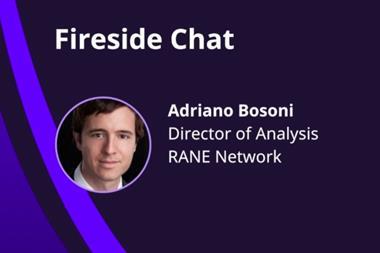
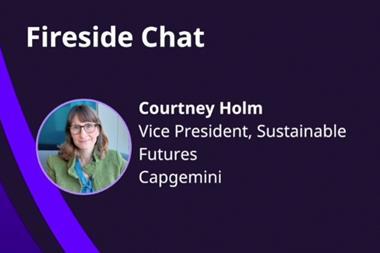
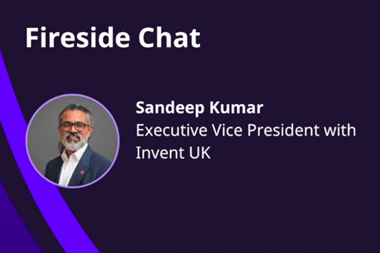
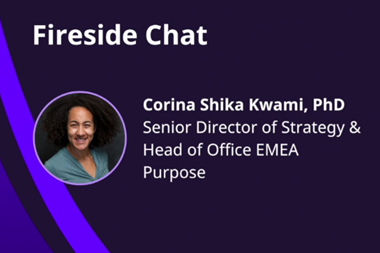
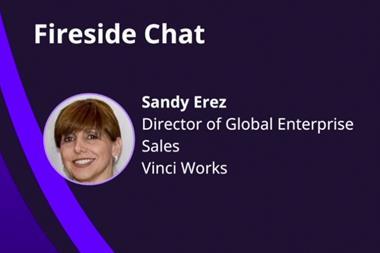





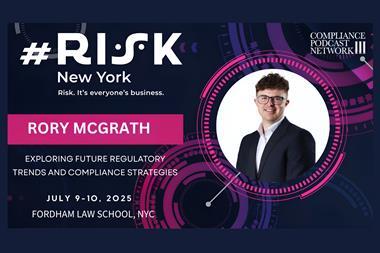
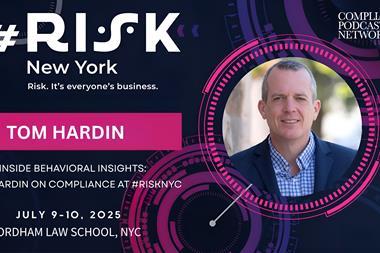
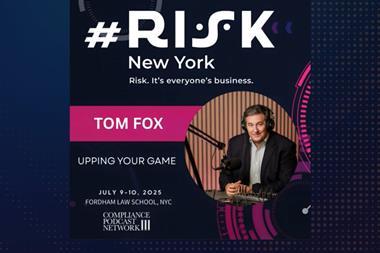




No comments yet